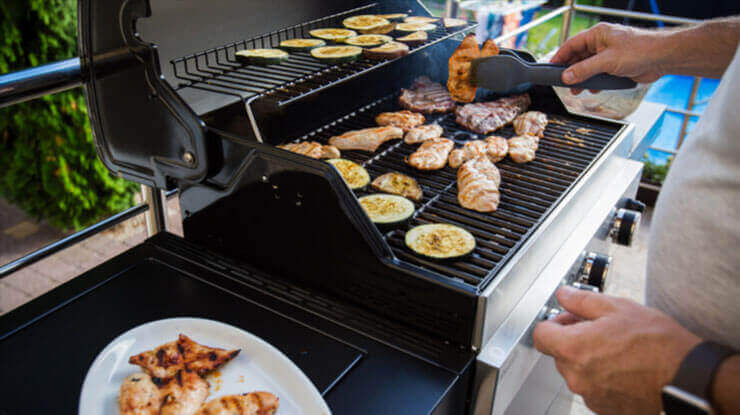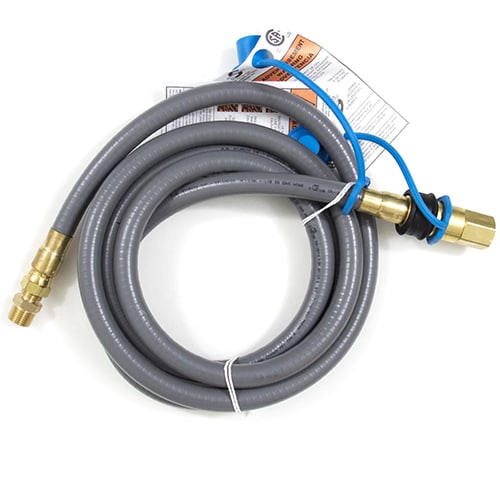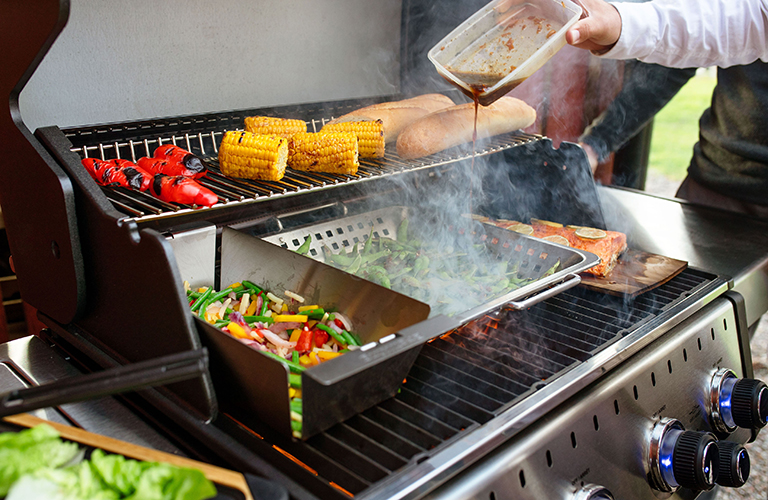
Introduction
Overview Of The Natural Gas Grill Vs Propane Grill Battle
When comparing natural gas and propane grills, it is crucial to understand the fundamental differences between the two options. Natural gas grills are directly connected to your home’s gas line, offering a continuous fuel supply without the need for refills or tank replacements. On the other hand, propane grills rely on refillable tanks, providing more portability and flexibility for outdoor use.
Factors To Consider Before Choosing Between Natural Gas And Propane
- Cost Considerations:
Criteria Natural Gas Propane Upfront Costs Initial installation may be higher due to gas line setup Lower initial costs as tanks are used Long-Term Expenses Generally lower due to the continuous fuel supply May incur higher costs with regular tank refills - Convenience and Accessibility:
- Natural Gas: Offers a constant fuel source without the need for monitoring or refills.
- Propane: Provides the flexibility of easily swapping out tanks for outdoor grilling.
- Gas Line Considerations:
- Ensure feasibility and cost-effectiveness of installing a gas line if opting for a natural gas grill.
- Carbon Footprint Evaluation:
- Assess the environmental impact of both fuels and choose accordingly for sustainability without adding to the greenhouse gas emissions.
When making the decision between natural gas and propane grills, it is essential to weigh these factors based on your preferences and needs to determine which option aligns best with your lifestyle.
Performance Comparison
Performance Similarities Between Natural Gas And Propane Grills
When comparing the performance of natural gas and propane grills, it is important to note that there is no significant difference in how they cook food under normal conditions. Both types of grills can reach high temperatures quickly, making them suitable for various grilling tasks. Whether you opt for a natural gas grill connected to your home’s gas line or a propane grill using refillable tanks, the cooking results are quite similar.
Effects Of Extreme Weather Conditions On Grill Performance
The only time when a slight performance difference may be noticeable between a propane grill and a natural gas grill is during extremely cold weather conditions, such as in the Arctic. In such cases, propane may struggle to maintain consistent heat levels compared to natural gas, which is less affected by temperature variations. However, for the majority of grilling situations in moderate climates, both types of grills perform equally well.
It is essential to consider your specific grilling needs and the environmental factors in your area before deciding between a natural gas or propane grill. While natural gas offers the convenience of a continuous fuel supply and may have lower long-term costs, propane provides portability and flexibility for outdoor grilling. Ultimately, the decision between the two will depend on your access to fuel sources and the associated costs in your location.
Convenience Factor
Convenience Of Using Natural Gas For Grilling
When it comes to the convenience of using natural gas for grilling, one of the primary advantages is the continuous fuel supply. Natural gas grills are connected directly to the gas line of your home, ensuring that you never run out of fuel during your grilling sessions. This eliminates the need to monitor and refill propane tanks, providing a hassle-free experience for those who grill frequently. Additionally, since natural gas is piped directly to the grill, there is no concern about running out of fuel midway through cooking, making it a reliable option for avid grillers.
Convenience Of Using Propane For Grilling
On the other hand, propane grills offer a different set of conveniences, primarily in terms of portability. The use of refillable propane tanks allows for greater mobility, making propane grills ideal for outdoor activities such as camping, tailgating, or picnicking. The ability to easily move the grill around without the constraints of a fixed gas line provides flexibility in choosing where to set up your grilling station. While propane may require occasional tank refills, the trade-off in portability and convenience is often worth it for those who prioritize versatility in their grilling experiences.
In conclusion, the choice between natural gas and propane for grilling ultimately boils down to your specific needs and preferences. Each fuel type offers its own set of conveniences, with natural gas providing a continuous fuel supply and propane granting portability. Consider factors such as the frequency of grilling, desired mobility, and access to fuel sources when deciding which option aligns best with your grilling lifestyle.

Cost Analysis
Cost Comparison Between Natural Gas And Propane Grills
Comparison Factor | Natural Gas | Propane— | — | —Initial Cost | Typically more expensive due to installation of gas line | Lower initial cost as propane tanks can be easily purchasedOperating Cost | Lower cost per unit of fuel | Higher cost per unit of fuel, but can be more efficientLong-term Cost | May be cheaper due to lower operating cost | May be more expensive over time if using frequently
Factors Affecting The Cost Of Operating Natural Gas And Propane Grills
Natural Gas Grill:
- Installation: Initial cost may be higher due to installation of gas line.
- Fuel Cost: Generally cheaper on a per-unit basis.
- Efficiency: Natural gas grills can be more efficient, potentially leading to lower overall fuel consumption.
Propane Grill:
- Initial Cost: Lower initial cost as propane tanks can be purchased readily.
- Fuel Cost: Higher cost per unit of fuel, but may still be cost-effective in the long run.
- Portability: Increased mobility may offset higher fuel costs for some users.
In evaluating the cost differences between natural gas and propane grills, it’s important to consider not just the immediate expenses but also the long-term operating costs and specific usage scenarios. The choice between the two fuels depends on factors such as frequency of use, mobility needs, and accessibility to fuel sources. Each option presents its own trade-offs in terms of upfront investment, fuel efficiency, and convenience, so selecting the most suitable grill type involves weighing these considerations against individual preferences and requirements.
Environmental Impact
Environmental Implications Of Using Natural Gas Grills
When considering the environmental impact of using natural gas grills, it is important to note that natural gas is a cleaner burning fuel compared to propane. While both fuels are fossil fuels, natural gas produces lower carbon dioxide emissions and pollutants when burned. This means that using a natural gas grill can result in slightly lower environmental impact compared to propane grills. Additionally, natural gas is a more sustainable option as it is derived from underground gas reserves and is continuously replenished.
Environmental Implications Of Using Propane Grills
In contrast, propane grills have a higher environmental impact compared to natural gas grills. Propane is a byproduct of natural gas processing and petroleum refining, which involves energy-intensive extraction and production processes. The transportation and storage of propane in tanks also contribute to greenhouse gas emissions and energy consumption. While propane grills are convenient and portable, they have a greater reliance on fossil fuels and can have a more significant environmental footprint compared to natural gas grills.
Overall, when considering the environmental implications of using grills, opting for natural gas over propane can lead to slightly lower emissions and reduced environmental impact. However, it is essential to weigh this factor against other considerations such as cost, efficiency, and personal preferences when choosing between the two fuel options for outdoor cooking.
Safety Considerations
Safety Features Of Natural Gas Grills
When it comes to safety considerations, natural gas grills have certain features that make them a safer option for outdoor cooking. Natural gas, being lighter than air, has a tendency to dissipate into the atmosphere more quickly than propane in case of a leak. This property reduces the risk of gas buildup and potential accidents. Additionally, natural gas grills have modern safety mechanisms, such as automatic shutoff valves, to prevent gas leaks and fire hazards. These features contribute to creating a safer cooking environment for users.
Safety Features Of Propane Grills
Propane grills also come with safety features that ensure safe operation and usage. One notable safety feature of propane is its flammability range, which is the temperature range at which propane will ignite. This range is considered safer than certain other fuel sources, as it requires specific conditions for combustion to occur. Additionally, propane tanks are equipped with pressure relief valves to prevent excessive pressure buildup and the risk of explosion. Overall, propane grills are designed with safety in mind to provide users with a secure cooking experience.

Installation Process
Installation Process Of A Natural Gas Grill
Installing a natural gas grill requires careful attention to detail and adherence to safety protocols. Firstly, ensure that the natural gas line is properly connected to the grill following the manufacturer’s guidelines. It is crucial to check for any leaks by using a soap and water solution to detect escaping gas. Next, make sure that the grill is placed in a well-ventilated outdoor area with sufficient clearance from any combustible materials. Finally, conduct a test run of the grill to ensure that it is functioning correctly and that all safety features are operational.
Installation Process Of A Propane Grill
Setting up a propane grill involves similar steps to that of a natural gas grill but with a focus on the specific requirements of propane systems. Begin by carefully connecting the propane tank to the grill, ensuring a secure and leak-free connection. Like with natural gas grills, it is essential to conduct a leak test using a soap and water solution before operating the grill. Additionally, position the propane grill in an open outdoor space away from any flammable objects to prevent accidents. Finally, test the grill to verify that it ignites smoothly and that all safety mechanisms are functioning correctly.
Maintenance And Durability
Maintenance Requirements For A Natural Gas Grill
When it comes to maintaining a natural gas grill, regular upkeep is essential for optimal performance. This includes cleaning the burners and grates regularly to prevent clogs and ensure even heat distribution. Inspecting the gas lines for any leaks or damages is crucial to prevent safety hazards. Additionally, checking the ignition system and cleaning out the drip tray can help prolong the lifespan of the grill.
Maintenance Requirements For A Propane Grill
Propane grills also require routine maintenance to ensure longevity and efficiency. Cleaning the burners and removing any grease buildup is necessary to prevent flare-ups and uneven cooking. Inspecting the propane tank for leaks and ensuring all connections are secure is vital for safety. Regularly checking the hoses and valves for wear and tear can help prevent gas leaks and potential accidents. Proper storage and covering the grill when not in use can also contribute to its durability.
Maintenance And Durability
Maintenance Requirements For A Natural Gas Grill
When it comes to maintaining a natural gas grill, regular upkeep is essential for optimal performance. This includes cleaning the burners and grates regularly to prevent clogs and ensure even heat distribution. Inspecting the gas lines for any leaks or damages is crucial to prevent safety hazards. Additionally, checking the ignition system and cleaning out the drip tray can help prolong the lifespan of the grill.
Maintenance Requirements For A Propane Grill
Propane grills also require routine maintenance to ensure longevity and efficiency. Cleaning the burners and removing any grease buildup is necessary to prevent flare-ups and uneven cooking. Inspecting the propane tank for leaks and ensuring all connections are secure is vital for safety. Regularly checking the hoses and valves for wear and tear can help prevent gas leaks and potential accidents. Proper storage and covering the grill when not in use can also contribute to its durability.
Conclusion
Summary Of The Key Differences Between Natural Gas And Propane Grills
Key Differences between Natural Gas and Propane Grills
| Aspect | Natural Gas Grill | Propane Grill |
|---|---|---|
| Fuel Source | Connected to natural gas line at home | Uses portable propane tanks |
| Convenience | Continuous fuel supply without refilling | Requires periodic refills of propane tanks |
| Maintenance | Regular inspection of gas lines and burner cleaning | Routine cleaning of burners, tank inspections, and hose checks |
| Performance | No significant performance difference unless in extreme cold conditions | Similar performance unless in extreme cold conditions |
| Cost | Initial conversion cost may be higher, but cheaper fuel costs in the long run | Lower upfront cost, but higher ongoing fuel expenses |
Final Thoughts On Choosing The Right Grill For Your Needs
In the end, the decision between a natural gas and propane grill comes down to personal preference, convenience, and access to fuel sources. Consider your grilling habits, maintenance capabilities, and budget when selecting the right grill for your outdoor cooking needs. Both types of grills can provide excellent results, so choose the one that aligns best with your lifestyle and requirements.
FAQ About Natural Gas Grill Vs Propane: Grill Battle
Q: What is the primary difference between a natural gas grill and a propane grill?
A: The main difference lies in the fuel source they use. Natural gas grills are connected to a natural gas line, while propane grills use propane tanks.
Q: Which grill is more cost-effective in the long run?
A: Natural gas grills are typically more cost-effective in the long term as natural gas tends to be cheaper than propane on a per-unit basis.
Q: Are there any differences in heat output between natural gas and propane grills?
A: Both types of grills can reach high temperatures suitable for grilling, but propane grills generally provide slightly higher heat output than natural gas grills.
Q: Can I convert a propane grill to a natural gas grill or vice versa?
A: Some grills are designed to be convertible between natural gas and propane, but not all models offer this option. It’s important to check with the manufacturer before attempting any conversion.
Q: Are there any safety considerations to take into account when using natural gas or propane grills?
A: Both natural gas and propane grills are safe when used correctly, but proper ventilation and regular maintenance are essential to minimize any potential risks associated with gas grills.
Q: Which grill type is more environmentally friendly?
A: Natural gas is considered the more environmentally friendly option as it produces fewer emissions compared to propane when burned.
Q: Does the choice between a natural gas or propane grill impact the flavor of the food?
A: Generally, there is no significant difference in the flavor of the food cooked on a natural gas grill versus a propane grill. The cooking method and ingredients used have a more noticeable effect on flavor.

Gourmet Tiger, a culinary sensation, was established with a vision to delight taste buds and create unforgettable dining experiences. Specializing in cakes, casseroles, lunch, catering, and more, Gourmet Tiger has become a household name synonymous with exquisite flavors and impeccable service. Since its inception, Gourmet Tiger has been dedicated to crafting delectable treats and savory dishes that exceed expectations. Their commitment to using only the finest ingredients and innovative culinary techniques has set them apart as a leader in the food industry.